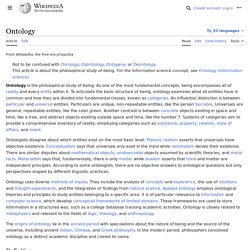

Epistemology. Epistemology ( i/ɨˌpɪstɨˈmɒlədʒi/; from Greek ἐπιστήμη, epistēmē, meaning "knowledge, understanding", and λόγος, logos, meaning "word") is a term first used by the Scottish philosopher James Frederick Ferrier to describe the branch of philosophy concerned with the nature and scope of knowledge[1][2] and is also referred to as "theory of knowledge".

Put concisely, it is the study of knowledge and justified belief. It questions what knowledge is and how it can be acquired, and the extent to which knowledge pertinent to any given subject or entity can be acquired. Much of the debate in this field has focused on the philosophical analysis of the nature of knowledge and how it relates to connected notions such as truth, belief, and justification.
The term was probably first introduced in Ferrier's Institutes of Metaphysic: The Theory of Knowing and Being (1854), p. 46.[3] Background and meaning[edit] Ontology. Study of the nature of being, becoming, existence or reality, as well as the basic categories of being and their relations Parmenides was among the first to propose an ontological characterization of the fundamental nature of reality.

Etymology[edit] While the etymology is Greek, the oldest extant record of the word itself, the New Latin form ontologia, appeared in 1606 in the work Ogdoas Scholastica by Jacob Lorhard (Lorhardus) and in 1613 in the Lexicon philosophicum by Rudolf Göckel (Goclenius). The first occurrence in English of ontology as recorded by the OED (Oxford English Dictionary, online edition, 2008) came in a work by Gideon Harvey (1636/7–1702): Archelogia philosophica nova; or, New principles of Philosophy. Leibniz is the only one of the great philosophers of the 17th century to have used the term ontology.[6] Overview[edit] Some fundamental questions[edit] Principal questions of ontology include:[citation needed] Concepts[edit] Types[edit] History[edit] Hindu philosophy[edit]
Bildungsroman. In literary criticism, a bildungsroman (German pronunciation: [ˈbɪldʊŋs.ʁoˌmaːn]; German: "novel of formation/education/culture"), [a] novel of formation, novel of education,[2] or coming-of-age story (though it may also be known as a subset of the coming-of-age story) is a literary genre that focuses on the psychological and moral growth of the protagonist from youth to adulthood (coming of age), and wherein character change therefore is extremely important.

History[edit] The term was coined in 1819 by philologist Karl Morgenstern in his university lectures, and later famously reprised by Wilhelm Dilthey, who legitimized it in 1870 and popularized it in 1905. The genre is further characterized by a number of formal, topical, and thematic features.[7] The term coming-of-age novel is sometimes used interchangeably with bildungsroman, but its use is usually wider and less technical. The genre translates fairly directly into cinematic form, the coming-of-age film.
Plot outline[edit]